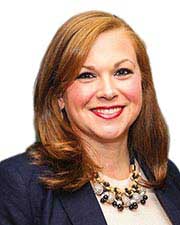The New England Real Estate Journal connected with Cameron Blackey of Travelers for thoughts on her career, her job’s biggest challenges, and how to get more women working in construction.

Q: Tell us a little about your role with Travelers and how long you’ve been with the company.
A: I started with Travelers right out of college in 2001, so this is my 18th year. I am currently the managing director for our contract surety group for New England. I graduated from Bates College with degrees in history and psychology, and most people who come into the surety business usually have a finance, accounting or math background. The irony is that I think a history major and a psychology major might be far more beneficial in an underwriting capacity. So much of what we’re doing in underwriting is looking at trends, looking at past behavior and looking at how the company has performed on different types of work. But mainly, we’re a people business. Understanding what’s going to motivate people, what their capacity is, their character, their organization – that psychology component is huge.
I’ve always been in a front-line field underwriting role until seven years ago, when I transitioned into a management position. I’m still in the field, in an underwriting capacity, but now managing a team. The New England region for construction services at Travelers comprises offices in Braintree, Massachusetts; Hartford, Connecticut; and Portland, Maine.
Q: What is surety bonding?
A: People say, “Your word is your bond” and it’s kind of funny, but in this case, it is. A bond is a third-party guarantee, it’s Travelers saying that if one of our construction clients doesn’t perform a contractual obligation, then we will.
It’s not an insurance product; in fact, we’re providing a form of credit. We’re protecting the performance of construction projects according to contracts, and we’re protecting the payment of the suppliers, the subcontractors, the laborers and all the people who worked on that job, so in that way, we’re protecting taxpayer money, we’re protecting lender money. We’re guaranteeing that jobs get built the way they’re supposed to: On time, on budget and according to contract.
Q: What do you like most about your job?
A: I love underwriting. I’m the daughter of a detective, and I love the investigation piece of it, from analyzing the data to getting to a specific recommendation on what we think we need to do and how to help. We have a mission statement here at Travelers for our construction surety business: We’re in the business of helping contractors succeed. We pride ourselves on being a partner to our construction clients and agents. When we truly understand the business plan, goals and challenges our construction clients face, we can help them make decisions that will benefit their company.
Every day brings a different challenge, despite the business not having changed that much in terms of what the business itself is. It appeals to me that one day you’re an accountant, one day you’re a lawyer, the next day you’re a contractor, the next day you’re a consultant. It’s never the same thing twice, and I think that’s exciting.
Q: Construction isn’t an industry known for having a lot of females in the workforce. Why should women think about working in construction?
A: When I was 21, I noticed that there were hardly any other women in surety, but that was partially what attracted me to this business. I thought of myself as someone who would work better in a field that was mostly men. Starting out, most of my role models were men, my style was molded by the men around me that I respected. Over time, my opinion has really evolved. It’s a lot less about being male or female and a lot more about what type of personality succeeds in this business. You’ve got to have a sense of humor, have humility, be assertive, think on your feet and not take yourself too seriously. You’ve got to get along well with people and have good communication skills. If you have all those things, I just don’t think it matters if you’re a man or a woman.
Q: What is your biggest challenge working in construction?
A: My biggest challenge is that I don’t actually work in construction. What makes underwriters valuable to their construction clients is their experience, their knowledge and what they’re able to share. Not having a construction background, you’ve got to backfill that as best you can.
I’m always working to make sure that I understand as best I can without having that technical knowledge, because I’m not an engineer, I’m not a construction manager.
At Travelers Bond, we understand we may not be able to help a contractor build better, but we can help our clients run a better business.
Q: Based on your experience in construction, what advice would you give women who might be thinking of making it a career?
A: For me, I never wanted to be viewed as a woman construction bond underwriter. I’m a construction bond underwriter. Regardless of where I am, I always want people to be comfortable around me. If I’m working with a bunch of contractors and I’m in a room full of men, I’m talking about sports and I’m trying to put people at ease. I never want people to feel uptight around me, because I think that makes it harder to connect, and I’m always trying to connect with people and build a relationship.
Another thing that’s helped me is really listening, to what contractors are saying and sometimes what they’re not saying. It’s a consultative approach: Trying to get at what the real problem is, then working collaboratively to move something forward.
Cameron Blackey is managing director, construction services at Travelers Bond & Specialty Insurance.








